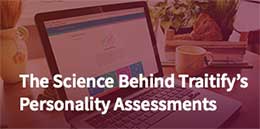In the opening credits to the cult TV series, The Prisoner, Patrick McGoohan rails against his mysterious captors and says: “I am not a number, I am a free man.” And in many ways this reflects the viewpoint of personality test skeptics: I am a complex person, I cannot be categorized, and I am free to do as I will. The essence is that I am unique and my character cannot be captured by anything as ‘simplistic’ as a personality test.
However, and apologies to any skeptics, well designed and effective personality tests are pretty good at capturing what people are like. But if you’re still dubious, let’s take a look at the top three objections.
Humans are (just too) complex
The argument goes that tests are hopelessly reductionist. Whether they’re used to identify personality types, or to assess core personality traits, it all boils down to the same thing: they describe humans using a fixed number of attributes.
Hey, I for one cannot be put in a box! But if you feel like this have you stopped to consider how you describe other people’s personalities? Turns out we all appraise people in extremely stereotypical ways. This involves making unconscious inferences based on things that are unrelated to personality such as individual characteristics like gender, age and nationality.
On the other hand, tests are neutral and concentrate on general aspects of how someone might actually think, act and feel. These are typically encapsulated in the so-called ‘Big Five’ personality factors of Openness (to experience), Conscientiousness, Extraversion, Agreeableness and Neuroticism (emotional stability).
In addition, these fundamental aspects of personality overlap with other ways of looking at similar attributes, such as John Holland’s six career themes. If you’ve ever done a career development questionnaire chances are it was based on his theory of vocational personalities.
So perhaps the answer is that tests do simplify, but the simplification is based on the known links between underlying personality and observable behaviors, not things that have nothing to do with it. It should also be mentioned that in terms of the Big Five, the use of five broad axes of personality represents a much more sophisticated view of personality than that used by most lay people!

Tests are inaccurate
Okay, okay, but tests produce results that people disagree with. That cannot be fair. Well, yes, tests might sometimes produce results that do not seem to describe the person being assessed. That’s why the results should always be validated directly with the person in question. And the corollary is that personality tests should not automatically be used to select candidates for jobs.
Also, if you think about it, your only criterion for whether something works or not is generally whether you agree with it. And that’s the problem, because being a fallible human your perception of yourself is likely to be somewhat inaccurate and exaggerated. Let’s face it, most of us tend to have a rather optimistic view of ourselves.
This is captured in the ‘above average effect’. We all have a tendency to over-estimate our own qualities, and especially performance, relative to other people. To put it simply, we have a built-in superiority bias. This is often reflected in literature; for instance in Garrison Keillor’s fictional US town, Lake Wobegon, in which he reports that “all the children are above average”.
By way of contrast personality tests are geared to making predictions about someone’s real-world behavior, not what they imagine they’re like compared to other people. And there’s plenty of evidence to back this up, research demonstrating that personality is predictive of many core work-related metrics, including overall performance, motivation and satisfaction.

Personality changes
Hah, get out of this one! I behave in a different way depending on how I feel, where I am, whom I’m with… Absolutely, you may behave in different ways depending on the context. But personality isn’t the same thing as behavior.
It’s worth saying again: personality isn’t the same thing as behavior. Personality influences how you are likely to behave in different situations, and how your behavior might differ from other people. If you like it’s your ‘default setting.’ All other things being equal, it predicts how you are likely to behave.
For a single occasion it gives us one of the best indicators of what you’re likely to do. Extend that over longer time periods and it provides some quite startling results. For example, personality is one of the best predictors of career success over a 50-year working lifespan, both in intrinsic (e.g. satisfaction) and extrinsic (e.g. status) terms, with conscientiousness being the driving factor. The point is that over time what you do is predictable.
To summarize, it seems evident that individuals, teams and organizations can significantly benefit from understanding how personality influences performance. This makes it strange that some people are happier relying entirely on their gut instinct to make important recruitment or team development decisions. After-all, the science is out there, why not use it?
Want to understand the influence of personality in the workplace? Check out the Work Solutions that Traitify offers.




 Subscribe to Our Blog
Subscribe to Our Blog 
